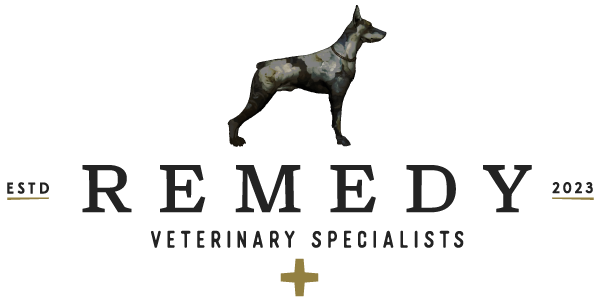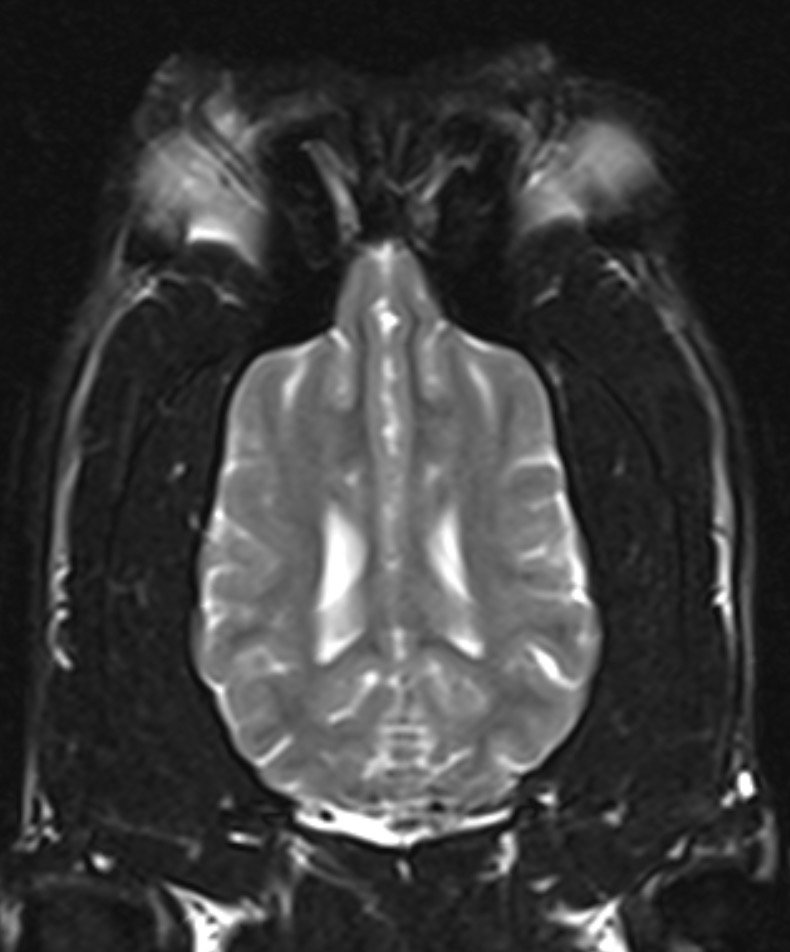Canine Cognitive Disorder
Introduction to canine cognitive disorder
Canine Cognitive Dysfunction (CCD) is the dog equivalent of human dementia. It is fairly common in older pets, with some studies reporting as many of a third of 11 year old dogs showing at least one sign of CCD. It can be difficult to determine if your pet has CCD based on symptoms alone because similar symptoms occur in other neurologic diseases. Therefore, true diagnosis of CCD requires and MRI to look for other brain disease. On this MRI, if your pet has CCD we will often confirm brain atrophy (shrinking). Some people choose not to pursue advanced diagnostics such as an MRI because of factors like cost and the need for general anesthesia. It's important to update your veterinarian with any new symptoms, especially if they have not been definitively diagnosed (i.e. if they have not had an MRI).
Symptoms:
1) Learning and Memory Problems: Your pet may seem to no longer recognize familiar people, places or things. They may forget their training, including house training.
2) Changes in Activity: Some pets may be much more lethargic than usual. They may respond less to sounds and events that used to excite them. Conversely, some pets may show compulsive behaviors, like pacing, aimless wandering or barking with no purpose.
3) Alterations in Sleep/Wake Cycle: A significant portion of dogs with these conditions have trouble falling asleep at night and may sleep heavily during the day.
This is an MRI of a healthy brain.
This is an MRI of a brain showing signs of CCD.
TREATMENT
Unfortunately there is no cure for CCD and overtime the symptoms will progress. The treatments available are aimed at slowing progression and improving some symptoms. There are four categories of treatments for CCD: Environmental Enrichment, Prescription Medications, Diet Therapy, and finally Supplements.
Environmental Enrichment:
Just like the muscles in your body, your brain needs a workout to stay healthy. You may of heard of the phrase “use it or lose it”. This is especially true in pets with CCD. Activities like training are a great way to keep your pet engaged- you can in fact teach an old dog new tricks! Playing with toys, exploring new environments and interacting with people are also great ways to keep your pet mentally stimulated.
Diet therapy:
There are two prescription diets and one over the counter diet that may be of benefit in CCD. These diets contain high levels of antioxidants and other supplements to encourage brain health. The prescription diets are Purina Neurocare and Hills B/D. Purina Brightminds for dogs 7 and up also contains these supplements, albiet at lower levels. Purina Neurocare may also be of benefit to dogs with seizures.
As with any therapeutic diet, it’s important that the vast majority of your pet’s food be this diet. Treats and additional food can make the diets ineffective. 90% of your pet’s calories should come from the therapeutic diet.
Medications:
It can take a month or so to notice improvement on medications, so patience is key. Not all medications work for every pet, so there is some trial and error involved in finding the right medication combination for your pet. Once a successful therapy regimen is found, we recommend that the pet stay on it life long.
Selegiline (Anipryl): This is an MAO-B inhibitor that increases the level of dopamine in the brain.
Pentoxyfylline: It is theorized that this medication improves blood flow to the brain and therefore cognitive activity is improved. This medication is most often used in patients not responsive to the other therapies.
Some pet’s also require sedatives to help them sleep through the night.
Supplements:
There are a variety of supplements which may be helpful in slowing the progress of CCD and managing some of its symptoms like difficulty sleeping and anxiety. There are a wide variety of products on the market that feature various combinations of products. If you have questions about a specific product, please reach out to the medical team. Ingredients that have found to be helpful in CCD include: B vitamins, antioxidants (vitamins E and C), Omega-3 fatty acids, SAM-e, selenium, medium chain triglycerides, DHA, eicosapentaenoic acid, Gingko biloba and arginine.
For pet’s with anxiety, CBD may be of benefits. You can learn more about CBD here.
For pet’s who have trouble sleeping at night or those with obsessive pacing/barking behaviors, melatonin can be helpful. This medication should be given 30 minutes prior to bedtime.
Small dogs: Give 3mg 30 minutes prior to bedtime
Large dogs: Give 6mg 30 minutes prior to bedtime
End of life care
Unfortunately this disease is not curable, and will progress despite our best efforts. Some pet owners will be faced with the hard decision of euthanasia. Pet’s can reach a point where they will forget how to eat and drink, forget their family members, lose house training, and may act fearful or anxious despite medication. At some point as loving pet parent’s, we have to make the call that their quality of life is suffering. We have some online resources to help you navigate this difficult decision and our medical team is happy to answer any questions you might have along the way.
Monitoring your pet
Please contact your veterinarian if your pet develops new symptoms or if existing symptoms seem to be getting worse. Symptoms of brain disease include:
Seizures
Change in personality
Difficulty staying awake
Difficulty sleeping
Difficulty walking
Dizziness
Circling
Blindness
Difficulty eating, drinking or swallowing
Contact Us:
Mon \ Fri: 8:30am - 5:30pm
Sat: by appointment only
Phone: (415)967-3303















